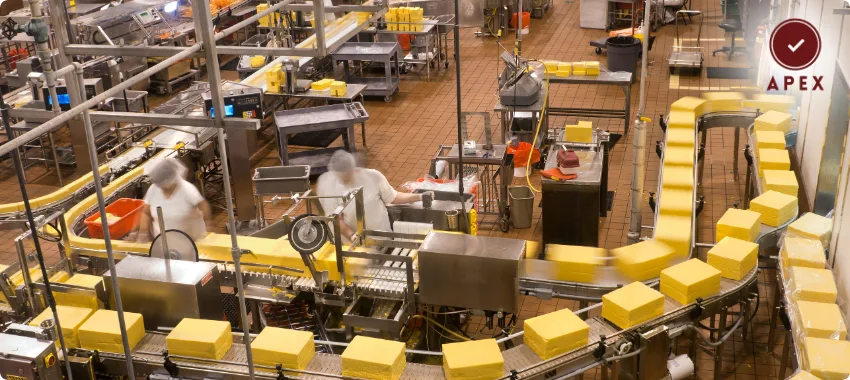HACCP Certification in Ras Al Khaimah

We operate as a professional HACCP certification provider in Ras Al Khaimah to help food businesses achieve safety and compliance standards with consumer trust levels.
Our certified auditors work with businesses that have already completed their ISO consultancy phase, providing HACCP certification based on the work and guidance established during the consultancy process. We do not provide any consultancy services; Apex SC just ensures your food safety systems meet the highest standards. The expansion of food production, distribution, and retail activity throughout the Emirate creates rising demands for organizations to avoid contamination while ensuring food safety standards. HACCP defines Hazard Analysis and Critical Control Points as a strict framework that organizations worldwide use to determine food safety risks during supply chain operations.
Understanding Hazard Analysis and Critical Control Points (HACCP)
Hazard Analysis and Critical Control Points (HACCP) serves as a preventive food safety program dedicated to discovering potential hazards within food manufacturing systems, which include biological, chemical, and physical elements. Companies using HACCP focus on minimizing food safety risks rather than responding to them after they emerge. HACCP serves all major food sectors and manufacturing industries while providing the foundation for safe food distribution to consumers through the marketplace.
The Seven Principles of HACCP Ensure a Safer Food Chain
The HACCP principles are the basis of the system. These comprise hazard analysis, critical control point identification (CCP), setting up critical limits, monitoring procedures, corrective action procedures, verification procedures, and documentation. These steps, when combined together, will mean that all food safety hazards are identified, controlled, and monitored on a continuous basis.
We assist enterprises in Ras Al Khaimah to implement each of these rules in their food safety systems. If you are running a restaurant, a food processing plant, or a packaging factory, all these principles will help you to reduce the risk of food safety issues and have all the products that you process reach the demanded level of safety. Our trained staff offers hands-on training, documentation service, and audit preparedness to ensure your personnel develops an effective and powerful HACCP-based system.
HACCP and Its Role in Food Safety Management Systems (FSMS)
HACCP is often integrated into a broader Food Safety Management System (FSMS) and works in harmony with international standards like ISO 22000. While HACCP provides the strategic steps for food hazard control, ISO 22000 offers a more comprehensive structure that includes management policies, communication protocols, and system evaluations. Together, they form a complete FSMS that addresses both the strategic and operational elements of food safety.
For businesses in Ras Al Khaimah, implementing HACCP as part of an FSMS is a practical step toward international compliance and competitive differentiation. It helps build customer confidence, meets regulatory requirements, and opens doors to new market opportunities.
Why HACCP Certification Is Needed in Ras Al Khaimah
Food safety is not just a regulatory requirement; it's a moral and business imperative. With the increasing risk of foodborne illnesses and strict inspections from local and international authorities, HACCP certification is essential for any food-related business operating in Ras Al Khaimah. Certification helps you meet the requirements of the UAE's food safety laws while showing customers and partners that your organization is committed to delivering safe, clean, and high-quality products.
By identifying potential risks early and reducing waste, recalls, and legal liabilities, HACCP enhances operational efficiency. From hospitality and catering to food export and retail, organizations across Ras Al Khaimah benefit from the streamlined processes and risk mitigation that HACCP provides. We ensure that every step of the certification process is aligned with your specific needs and business model.
FAQs
- ISO 9001 Certification in Ras AL Khaimah
- ISO 14001 Certification in Ras AL Khaimah
- ISO 45001 Certification in Ras AL Khaimah
- HACCP Certification in Ras AL Khaimah
- ISO 22000 Certification in Ras AL Khaimah
- GMP Certification in Ras AL Khaimah
- Halal Certification in Ras AL Khaimah
- ISO 27001 Certification in Ras AL Khaimah
- ISO 22301 Certification in Ras AL Khaimah
